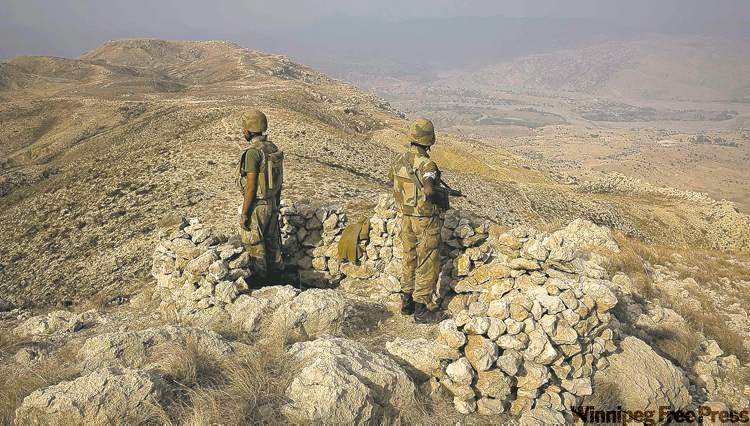Homegrown terror threat growing
Radicalized Westerners attending terrorist training camps
Advertisement
Read this article for free:
or
Already have an account? Log in here »
To continue reading, please subscribe:
Monthly Digital Subscription
$0 for the first 4 weeks*
- Enjoy unlimited reading on winnipegfreepress.com
- Read the E-Edition, our digital replica newspaper
- Access News Break, our award-winning app
- Play interactive puzzles
*No charge for 4 weeks then price increases to the regular rate of $19.00 plus GST every four weeks. Offer available to new and qualified returning subscribers only. Cancel any time.
Monthly Digital Subscription
$4.75/week*
- Enjoy unlimited reading on winnipegfreepress.com
- Read the E-Edition, our digital replica newspaper
- Access News Break, our award-winning app
- Play interactive puzzles
*Billed as $19 plus GST every four weeks. Cancel any time.
To continue reading, please subscribe:
Add Free Press access to your Brandon Sun subscription for only an additional
$1 for the first 4 weeks*
*Your next subscription payment will increase by $1.00 and you will be charged $16.99 plus GST for four weeks. After four weeks, your payment will increase to $23.99 plus GST every four weeks.
Read unlimited articles for free today:
or
Already have an account? Log in here »
Hey there, time traveller!
This article was published 02/10/2010 (5526 days ago), so information in it may no longer be current.
The threat from radicalized Westerners who travel to terrorist training camps around the world is “growing in size and prominence” and stopping them is of the “highest priority,” according to a joint American-European study released Friday.
While some so-called Western “foreign fighters” may take up arms and fight battles in foreign conflict zones, such as the Afghanistan-Pakistan border, Somalia and Yemen, others may be sent back home following their training, said the study by George Washington University’s Homeland Security Policy Institute and the Swedish National Defense College’s Center for Asymmetric Threat Studies.
“Foreign fighters returning to their Western host nations armed with operational expertise, jihadist ‘street cred’ based upon their bona fides as mujahedeen (those who strive and fight in God’s path), and the capacity and intent to orchestrate domestic attacks represents a current and likely growing threat,” the study said.

The warning comes as Canadian and U.S. counterterrorism officials are reportedly trying to hunt down three Muslim university students from Manitoba who have been missing since they travelled to Pakistan in 2007.
The RCMP released a statement saying it is “concerned about Canadians going abroad to participate in terrorism-related criminal activities and maintains strong linkages with law-enforcement agencies around the world to monitor situations such as these.”
According to the study released Friday, there are advantages for foreign recruits to travel to a training camp with companions.
“Bringing a companion and friend to the foreign training camps may serve multiple operational purposes,” the study said.
“Being together with a friend reinforces the focus of the mission and reduces the chances an individual will turn back. Furthermore, it helps support group cohesion.”
The study said typical overseas training is sometimes limited to one month in a camp and involves training in basic bomb making.
Foreign fighters gain the most experience from participating in actual fighting in conflict areas and achieve almost “rock star” status — which can play an indispensable role in attracting future recruits.
“Due to their image and their ability to operate with a degree of competence upon returning to their Western host nation, veteran foreign fighters are thus the primary concern to host nations as opposed to trained foreign fighters with no applied experience,” the study said.
One mechanism authorities have to prevent terrorist travel is the no-fly list, but getting on that list is reliant on the strength of the intelligence, said Martin Rudner, a terrorism expert and professor emeritus at Carleton University.
If an individual is able to get on a plane and make it to a foreign training camp, the challenge for Canada then becomes how to gather evidence.
The absence of a Canadian foreign intelligence capability — the ability to send agents overseas who can infiltrate a terrorist camp and gather evidence of actual terrorist behaviour — could be a constraint, Rudner said.
— Postmedia News


